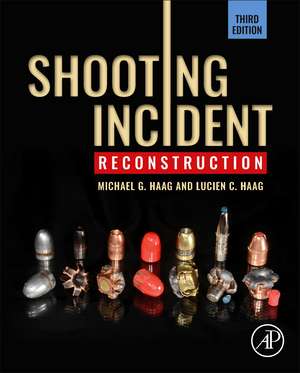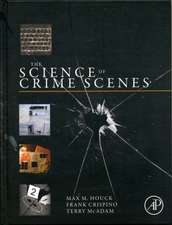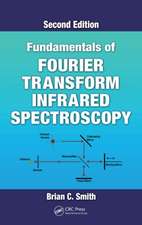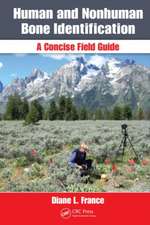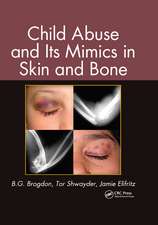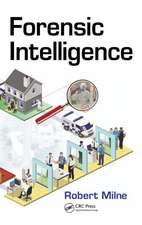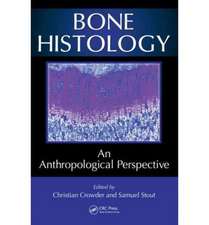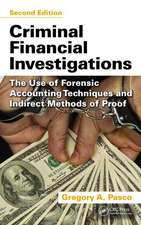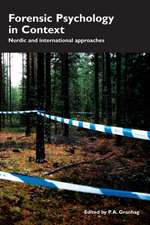Shooting Incident Reconstruction
Autor Michael G. Haag, Lucien C. Haagen Limba Engleză Hardback – 22 oct 2020
Forensic scientists, law enforcement, and crime scene investigators are often tasked with reconstruction of events based on crime scene evidence, along with the subsequent analysis of that evidence. The use and misuse of firearms to perpetrate crimes from theft to murder necessitates numerous invitations to reconstruct shooting incidents. The discharge of firearms and the behavior of projectiles create many forms of physical evidence that, through proper testing and interpretation by a skilled forensic scientist, can establish what did and what did not occur.
Written by the world's most well-respected shooting scene and ballistics experts, the book addresses the terminology, science, and factors involved in reconstructing shooting incident events to solve forensic cases. It covers the full range of related topics including: the range from which a firearm was discharged; the sequence of shots in a multiple discharge shooting incident; the position of a firearm at the moment of discharge; and the position of a victim at the moment of impact. The probable flight path of a projectile and the manner in which a firearm was discharged are also discussed. Case studies illustrate real-world application of technical concepts, supported by over 200 full-color diagrams and photographs.
This book will be of value to practicing forensic scientists (firearm and toolmark examiners), ballistics experts, crime scene personnel, police departments, forensic consultants (generalists), attorneys and judges, medical examiners (coroners), and forensic pathologists.
- New chapters on special reconstructive properties and value of shootings involving sub-machine guns or pseudo automatic firearms, rate of fire with special attention on shot-to-shot time intervals, human factors in shooting incidents
- Updated and revised glossary terms to fit with new technology and the emergence of standardization of terms by groups such as the Organization of Scientific Advisory Committees
- Provides clear practice standards and ethical guidelines for those involved in reconstructing shooting scenes
| Toate formatele și edițiile | Preț | Express |
|---|---|---|
| Hardback (2) | 500.19 lei 36-50 zile | |
| Elsevier – 28 iun 2011 | 500.19 lei 36-50 zile | |
| ELSEVIER SCIENCE – 22 oct 2020 | 587.22 lei 36-50 zile |
Preț: 587.22 lei
Preț vechi: 645.30 lei
-9% Nou
112.40€ • 122.13$ • 94.48£
Carte tipărită la comandă
Livrare economică 14-28 aprilie
Specificații
ISBN-10: 0128193972
Pagini: 580
Dimensiuni: 191 x 235 x 35 mm
Greutate: 1.21 kg
Ediția:3
Editura: ELSEVIER SCIENCE
Public țintă
Crime SceneInvestigators, Forensic
Scientists, Forensic Trainees,
Medical Investigators (scene
and autopsy), Attorneys and
Judges, Undergrad and
Graduate Forensic Programs,
and Law Libraries.
Cuprins
1. Case Approach, Philosophy, and Objectives 2. Working Shooting Scenes 3. The Reconstructive Aspects of Class Characteristics and a Limited Universe 4. Is It a Bullet Hole? 5. Some Useful Reagents and Their Application 6. Distance and Orientation Derived from Gunshot Residue Patterns 7. Projectile Penetration and Perforation 8. Projectiles and Glass 9. Projectile Ricochet and Deflection 10. The Principles of "Trajectory" Reconstruction 11. Determining Bullet Track in Gunshot Victims 12. Trace Evidence Considerations Associate with Firearms 13. True Ballistics: Long-Range Shootings and Falling Bullets 14. Cartridge Case Ejection and Ejection Patterns 15. The Shooting of Motor Vehicles 16. Shotgun Shootings and Evidence 17. Sound Level of Gunshots, Supersonic Bullets, and Other Impulse Sounds 18. Ultimate Objectives, Reports, and Court Presentations
Descriere
Shooting Incident Reconstruction, Third Edition, offers a thorough explanation of matters from simple to complex to help the reader understand the factors surrounding ballistics, trajectory, and shooting scenes.
Forensic scientists, law enforcement, and crime scene investigators are often tasked with reconstruction of events based on crime scene evidence, along with the subsequent analysis of that evidence. The use and misuse of firearms to perpetrate crimes from theft to murder necessitates numerous invitations to reconstruct shooting incidents. The discharge of firearms and the behavior of projectiles create many forms of physical evidence that, through proper testing and interpretation by a skilled forensic scientist, can establish what did and what did not occur.
Written by the world's most well-respected shooting scene and ballistics experts, the book addresses the terminology, science, and factors involved in reconstructing shooting incident events to solve forensic cases. It covers the full range of related topics including: the range from which a firearm was discharged; the sequence of shots in a multiple discharge shooting incident; the position of a firearm at the moment of discharge; and the position of a victim at the moment of impact. The probable flight path of a projectile and the manner in which a firearm was discharged are also discussed. Case studies illustrate real-world application of technical concepts, supported by over 200 full-color diagrams and photographs.
This book will be of value to practicing forensic scientists (firearm and toolmark examiners), ballistics experts, crime scene personnel, police departments, forensic consultants (generalists), attorneys and judges, medical examiners (coroners), and forensic pathologists.
- New chapters on special reconstructive properties and value of shootings involving sub-machine guns or pseudo automatic firearms, rate of fire with special attention on shot-to-shot time intervals, human factors in shooting incidents
- Updated and revised glossary terms to fit with new technology and the emergence of standardization of terms by groups such as the Organization of Scientific Advisory Committees
- Provides clear practice standards and ethical guidelines for those involved in reconstructing shooting scenes
Recenzii
Praise for the first edition: "Shooting Incident Reconstruction is an informative and comprehensive guide to the analysis of firearms at crime scenes ranging from accidental injuries to carefully planned murders . . . This book covers it all. No longer will investigators be forced to rely on eyewitness accounts alone; instead, they will be able to use the reconstructive aspects of firearms evidence to determine what did and did not happen at a crime scene." --Law Enforcement Technology"In creating this book, author Lucien C. Haag drew from years of experience in the field, first as a criminalist and later as the former technical director of Phoenix, Ariz., Police Department's forensic laboratory. Shooting Incident Reconstruction provides an explanation of the factors surrounding ballistics, trajectory, and shooting scenes for both the layman and the professional. Key concepts are supported and illustrated by more than 100 diagrams and photographs, many of which are in color. Gun enthusiasts will find much of this book of interest..." --American Rifleman
